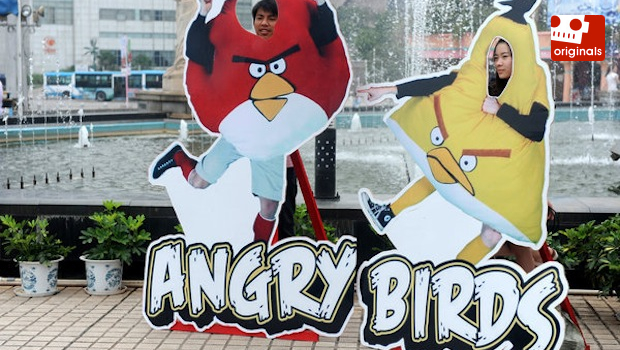Most companies go out of their way to protect their intellectual property. The scenarios, stories, and characters found in famous gaming titles are the lifeblood of many companies; allowing others to take their creative works can invite financial ruin.
Sometimes, though, a little copyright infringement might not be so bad. According to Rovio CEO Peter Vesterbacka, copyright infringement for Angry Birds products is running rampant in China … and that’s a good thing.

Taking the stage at TechCrunch’s Disrupt conference in Beijing last week, Vesterbacka presented a set of “Angry Birds” balloons to the crowd. I say “Angry Birds” in quotes as opposed to Angry Birds in italics because, as Vesterbacka pointed out, there seemed to be a lot of Angry Birds merchandise for sale in China, the vast majority of which was not licensed by Rovio. Yet Vesterbacka was sanguine on the topic of copyright infringement, stating that it showed a “proven demand” for Angry Birds in China.
Instead of starting the arduous task of hunting down every street vendor and game pirate providing Angry Birds games and merchandise in China, Vesterbacka felt the copyright infringement was actually helping to build a market for the for the Angry Birds brand. Vesterbacka believed the rampant copyright infringement was building the popularity of Angry Birds and would eventually lead to Rovio’s opening its first stores to capitalize on the demand.
The approach is uncommon in a tech company, but Vesterbacka stated, “The way we look at it, of course we want to see the officially licensed, good-quality products, but at the same time, we have to be happy about the fact that the brand is so loved that it is the most copied brand in China.” The game has already registered 50 million downloads in China, and Vesterbacka hopes to be at 100 million in the next year.

Is it really possible that allowing copyright infringement could be a good thing? I think either intuitively or based on our own experience, we can probably imagine a time when copyright infringement or bending the law in the tech world seemed like a reasonable, even good, option. Have you ever downloaded music from a foreign country that you couldn’t otherwise get your hands on? Have you ever imported a game outside of your region despite the fact that it wasn’t meant for sale in your area?
Sometimes, this sort of illegal activity acts to balance out a market that fails to provide a legal means for getting your hands on certain products. This doesn’t make it any less illegal, but when laws get in the way of willing consumers, there might be a problem. Vesterbacka isn’t faulting pirates and infringers in China because he understands his company isn’t providing Chinese consumers with the products they want. Even in Rovio’s absence, the Angry Birds brand can still grow due to the actions of fans and some enterprising “entrepreneurs.” Seems like a decent compromise, doesn’t it?
Vesterbacka’s comments fly in the face of the actions of many of our industry’s other gaming giants. Whether it is forcing complex DRM measures into games, requiring persistent online connections for even single-player experiences, or region-locking consoles and games to stop people from importing them into other countries, the industry is rife with schemes to control game properties. These issues only amount to a hassle for those of us in tech-centric countries like Japan and the US, but it can be easy to forget that those who live outside of territories where the tech world is established may struggle to get their hands on properties we take for granted.
In countries like Brazil where tariffs on things like videogames are extremely high, videogames may be prohibitively expensive for many to legally obtain. Without videogame companies and publishers making an effort to bolster their presence in such countries to bring down the prices, a little piracy and copyright infringement might be the only real options for those interested in getting into videogames. China is similar — with a government that heavily controls business practices and is not always welcoming to videogame companies, allowing copyright infringement to fill the gaps and provide people with the products they desire might help companies build mind share with the public, even if they can’t be there themselves.

I’m certainly not advocating that everyone go out and pirate games if they live outside videogame-inundated territories. If you live in a foreign country and have the means to get your games legally, you should do so. Still, Vesterbacka points out that even though Rovio isn’t making money on Angry Birds in China, they are allowing others to help build the future of the brand. Isn’t it better for companies to reach those who otherwise might never get to play their games, even if it means people won’t be able to pay for them? Companies may be building fans who might be able to pay for those games in the future.
Of course, there is always another side. Building a culture in which copyright infringement and piracy is the norm can create a standard of not paying for entertainment. That’s not a tenable business model for our artists and creators. Infringement might also lead to others’ creating low-quality products that give people a bad impression of a brand. Heck, isn’t the iTunes AppStore already letting people do that?
Copyright Law is at worst a necessary evil. It protects artists and creators from those who would freely distribute their work without care of the consequences. Yet, maybe Rovio’s choice not to go after pirates and infringers makes sense if it means fulfilling a demand the company can’t personally meet. If game companies don’t allow their brands to flourish in other territories, even if it means piracy and copyright infringement, those territories might not get to experience just how amazing the world of gaming really is. Maybe worse, people in areas like China might start to think Angry Birds is the pinnacle of gaming.








